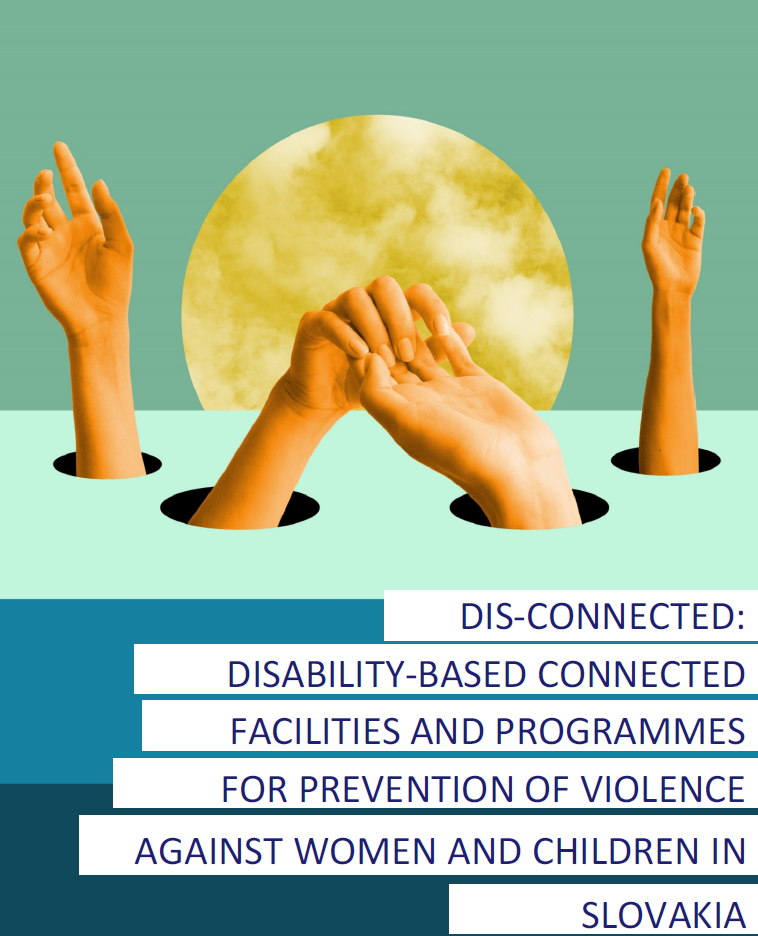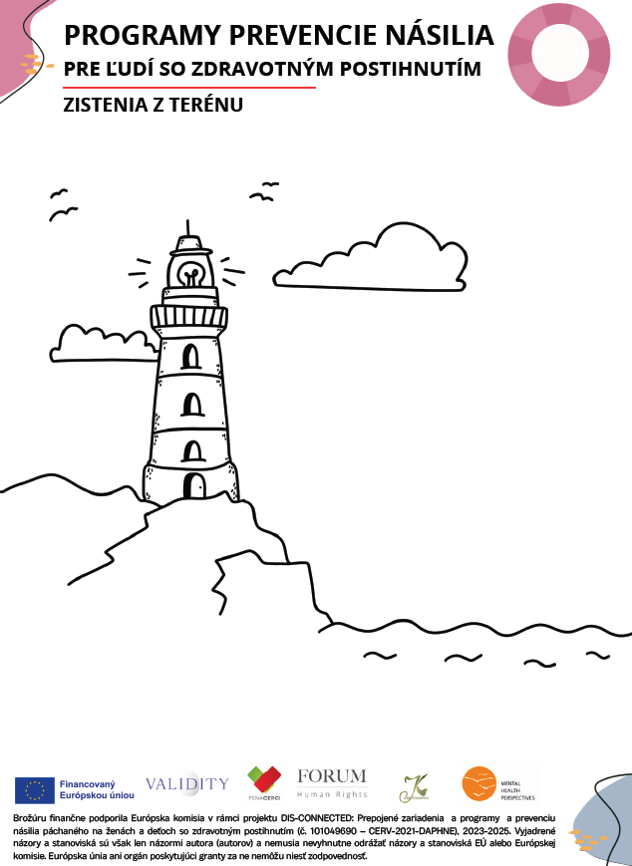Gender-based violence and violence against children in vulnerable situations is both overlooked and under-reported, and the recent COVID-19 pandemic further aggravated these issues. The global report of the COVID-19 Disability Rights Monitor recorded numerous testimonies suggesting a dramatic increase in gender-based violence against women and girls with disabilities, including rape, sexual assault, and harassment at the hands of law enforcement authorities and family members. We, therefore, joined forces with an international foundation VALIDITY and three other national partners and entered the EU-funded project called “Disability-based Connected Facilities and Programmes for Prevention of Violence against Women and Children“. This project focuses on improving ways that women and children can report violence and abuse, can access support services, and can move to a safer place. FORUM is the implementing partner in respect of Slovakia.
Women and children with intellectual and psychosocial disabilities are often seen as lacking credibility; and perpetrators can believe that there is minimal risk of being discovered and punished. Harmful stereotypes concerning disability and gender exacerbates the problem: persons with disabilities are not considered as sexual beings who experience intimacy, personal autonomy, shame, and privacy. Denial of their legal capacity in sexual and reproductive healthcare decisions is commonplace and obtaining their informed consent is often not considered necessary. This overlap between gender and disability contributes particularly to the high levels of violence against women and girls with intellectual and psychosocial disabilities.
Project description
The Disability-based Connected Facilities and Programmes for Prevention of Violence against Women and Children (DIS-CONNECTED) project focuses on women and children with mental disabilities who are victims of violence in facilities and programmes designed to serve them. The project will create a multi-disciplinary cooperation and response protocol with law enforcement, service providers and victim support workers to enable prevention, early identification, and protection against violence that women and children with psychosocial and/or intellectual disabilities face. Specifically, the project objectives are to:
- Improve reporting of violence through enhancing the knowledge base and improving monitoring relating to violence against women and children with mental disabilities in facilities and programmes that serve them;
- Build the capacity of independent professionals to prevent, detect and facilitate reporting of and redress for violence against women and children with mental disabilities;
- Enhance on-going cross-disciplinary reporting and response mechanisms through practical protocols;
- Improve access to services through the development of practical protocols and accessible online geo-location maps to signpost where victims should go to obtain the support they need.
The project will achieve this though combined implementation of the following activities, which will be implemented in 5 EU countries over 2 years:
- Developing and implementing tools for identifying and preventing exploitation, violence and abuse. This includes developing a monitoring methodology and tools, creating a training Handbook, and training multi-disciplinary monitoring teams to conduct monitoring of services and programmes. These tools will be piloted and later trained monitors will use them to monitor services or programmes in each country;
- Developing cross-disciplinary protocols on reporting and responding to allegations of violence, exploitation and abuse which will be created by national working groups of relevant stakeholders and will promote a coordinated practical approach to enhanced access to support, reporting and redress for victims;
- Promoting access to support services, resources and research findings through publishing a national report in each country that maps existing legal and policy measures on violence against women, violence against children, and on mental disability, together with an online map of accessible resources and referrals for women and children with mental disabilities who have experienced violence and abuse.
- The project will also produce an international synthesis report and convene an international conference to further disseminate the tools and recommendations internationally.
Research findings:
As part of our research on the prevention of violence and ill-treatment of women and girls with intellectual and psychosocial disabilities, we undertook group interviews with female clients of the facilities, as well as with selected staff members. The national report on our research findings (Slovakia) can be downloaded in Slovak and English language here:
At the same time, we have compiled our findings into an easy-to-read leaflet with information for people with disabilities, available (only in Slovak) for download here:
The project builds on the expertise and experience of the Validity Foundation and the Consortium partners, which have previously: created practical tools for people with disabilities-victims of crime, to facilitate their participation in criminal justice processes in the Voices for Justice project; have investigated access to justice for children with mental disabilities; exposed abuses against children with disabilities in institutions in the CHARM project; and developed tools to enhance the skills of legal professionals to represent children with mental disabilities in a project titled ‘Innovating European Lawyers to Advance the Rights of Children with Disabilities‘. Validity has also been involved at the COVID-19 Disability Rights Monitor and the Global Coalition on Deinstitutionalization initiatives.
Legal background
The project’s objectives and activities are grounded in the international and EU standards on access to justice for persons with disabilities. More information about the framework can be accessed here:
- United Nations’ Convention on the Rights of Persons with Disabilities
- Convention on the Elimination of all Forms of Discrimination against Women (CEDAW)
- International Covenant on Civil and Political Rights
- UN GA Resolution no. 72/162: Implementation of the Convention on the Rights of Persons with Disabilities and the Optional Protocol thereto: situation of women and girls with disabilities, A/RES/72/162 19 December 2017
- Guidelines on deinstitutionalization, including in emergencies
- European Union Strategy for the Rights of Persons with Disabilities 2021-2030
- UN GA Resolution no. 72/154: The girl child A/RES/72/154 19 December 2017
- UN GA Resolution no. 63/155: Intensification of efforts to eliminate all forms of violence against women A/RES/63/155 18 December 2008
Consortium Partners
Each participating country is represented in the consortium by an experienced NGO involved in the implementation of the project, as follows:
- Validity Foundation – Project coordinator, Hungary
- Forum for Human Rights, Slovakia
- KERA Foundation, Bulgaria
- Mental Health Perspectives, Lithuania
- Fenacerci – Federação Nacional de Cooperativas de Solidariedade Social, Portugal

Full name of the project
Disability-based connected facilities and programmes for prevention of violence against women and children (101049690 – CERV-2021-DAPHNE).

This project is co-funded by the European Union. Views and opinions expressed are however those of the author(s) only and do not necessarily reflect those of the European Union or the European Commission. Neither the European Union nor the granting authority can be held responsible for them.


